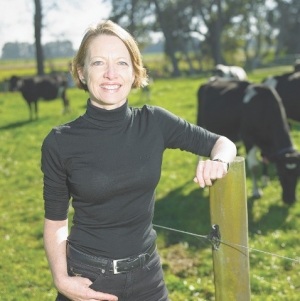An extra advantage in New Zealand’s milk is that cows feed on pasture with clover-ryegrass mixes. Research at the Institute of Grassland and Environmental Research in Wales has shown that clover increases the proportion of omega-3 fatty acids in the milk, and omega-3s play an important role in maintaining heart health, combating the effects of arthritis and assisting in the development of healthy brains in unborn children.
In the US high omega-3s are used in marketing organic milk because cows on organic systems graze on pasture, in contrast to the bulk of milk which comes from grain-fed cows in barns. Grain increases the proportion of omega-6. The balance between the two omegas is important, and clover assists.
New Zealand misses out by not making more of its pasture-based farming. Of more concern, New Zealand farmers miss out on added-value payments and that means less money coming into the country.
The concept of the cleanest milk is supported by research from the Netherlands published last year. Benchmarking of greenhouse gas (GHG) emissions for 38 countries showed New Zealand as below average in GHG production per kg of milk. The US achieved lowest GHG emissions. The authors reported that in general GHG emissions at the farm gate were lower from larger farms with higher productivity than smaller farms in developing countries.
On-going research and life cycle analysis by Dr Stewart Ledgard’s team at Agresearch continues to show that New Zealand is doing well in GHG efficiencies. The headline in the UK newspaper last month ‘Buy NZ lamb to save the planet’ makes the point.
Of equal importance is the suggestion in the Green Growth Report, released by Pure Advantage last month, that “business and government leaders can play a proactive international role in defending NZ’s clean green brand and improving performance and policies where there is a mismatch between perception and reality”.
Part of the policy could be in dealing with people who don’t support the brand, whether individuals or media.
Playing on the heart strings is easier than providing facts, but when it comes to water, the Ministry for the Environment website states: “our most nutrient-enriched rivers have about half the average nutrient levels of rivers in Europe, North America, and Asia.” This is why the Commissioner for the Environment, Dr Jan Wright, has suggested that New Zealand will have to decide what trade-offs it wants to make in the future. Technical fixes will cost money, and money is in short supply.
Cost benefit analysis will be an increasing focus as New Zealand struggles with the balance between economic growth and environment; Government support for this balance is growing. Minister for Primary Industries David Carter has questioned the cost-benefit analysis done by Horizons Regional Council on its controversial One Plan; he has shown the leadership that has been lacking from industry.
A decade ago the New York Times used the heading ‘It’s not easy being green when you’re deep in the red’. New Zealand needs industry leaders, informed by farmers, to assist local
and national government to give clear, costed, sensible and achievable directions on environmental issues.
Add innovation to the basket in products and marketing, and the new headline could be ‘Buy New Zealand-made to save the planet’. All New Zealanders would benefit.
• Jacqueline Rowarth is Professor of Agribusiness, The University of Waikato.
















